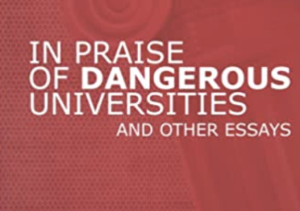In this essay, I explain that young people should come to university to be educated, and not to become credentialed; the public should support universities because universities educate young people, not because they produce credentialled workers.
Why should a young person want to go to university? Why should taxpayers pay any of the cost of someone’s university education?
One common view is that a young person should go to university to prepare for a career. On this view, taxpayers should be happy to foot at least part of the bill. They will benefit economically from the skills university graduates eventually bring to the workplace, and from the taxes they will pay on the higher incomes they eventually receive.
A problem with this suggestion is that most of what is taught to undergraduates at a university, especially in arts faculties, has little to do with jobs or careers. Moreover, whatever knowledge or skills a student might gain that would be relevant to the workplace could be acquired elsewhere—from parents or mentors, at a community college, in a professional school, or in the workplace itself, often much better and certainly more cheaply.
The view that getting a bachelor’s degree is about preparing for a career has had harmful effects on students and universities. It’s partly responsible for the high percentage of university students who don’t care much about their studies but just want to have a degree to show prospective employees. It’s also responsible for the tendency of universities to try to find ways of making what they offer relevant to the workplace, by, for instance, tailoring academic programmes to the perceived needs of employers or professional schools, or by instituting co-op education programs in which students gain academic credit for job experience.
The tendency to make universities relevant to employment harms universities by distracting students from what universities are really about and diluting the experience they provide. What universities should be about is liberal education. The only sound sufficient reason people can have to attend university is that they want an education or, better, want the experience of becoming educated.
Liberal education concerns both understanding and taste. At a university, students gain knowledge of both the natural and the social worlds and, more, the ability to explore those worlds for themselves. Their knowledge consists of theories, theories backed by arguments and evidence. They come to understand competing world views and to possess the resources needed to criticize and extend those views. And they come to possess the sensitivity required to respond aptly to the world as they understand it.
At its best, liberal education produces a critical cast of mind, including habits of circumspection and open-mindedness and a deep concern for argument and evidence. An educated person wants first to understand. Educated people always approach things in the spirit of investigation, even if their ultimate concern is to reform what they find.
That attending a university is only about becoming educated can make it difficult for taxpayers to see why they should support students financially. Clearly, education is good for the individual student, so long as the student cares to travel on an intellectual journey and to acquire the skills and habits of an intellectual. But why should taxpayers care to fund a student’s journey?
The primary reason why the public should support those who wish to cultivate their intellect and taste is that education is also a social good. The habits of mind and action that university students acquire are not just habits of intellectual life. They are also habits central to responsible citizenship. They are habits that make us all better citizens, parents, neighbours, co-workers, and friends.
Mark Mercer is a professor of philosophy at Saint Mary’s University in Halifax and president of the Society for Academic Freedom and Scholarship. This article is taken from the book In Praise of Dangerous Universities and Other Essays (2022), by Mark Mercer, published by the Frontier Centre for Public Policy and available only from Amazon.



